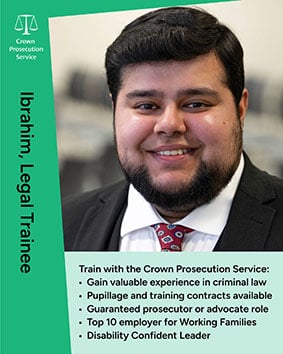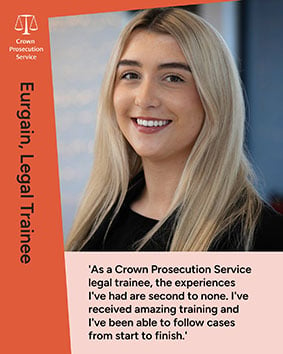 The Legal 500 Future Lawyers verdict on Crown Prosecution Service
The Legal 500 Future Lawyers verdict on Crown Prosecution Service
For many trainees, the Crown Prosecution Service stood out for the chance to make a tangible difference in the public sector. One trainee put it simply: “I knew I wanted to work in criminal law, and the Crown Prosecution Service offered better pay and benefits, training and opportunities than a criminal defence firm.” Others highlighted the “opportunity to specialise in criminal prosecution throughout the entirety of my training” and the “unique nature of the practice area, with advocacy opportunities.” Job security, pay and benefits, and the organisation’s “reputation for producing highly employable solicitors with versatile skills” were also major draws. Training at the Crown Prosecution Service is generally considered structured, supportive, and more hands-on than in private practice. As one notes, “We have in-house training at a high level, continued support and encouragement for growth. I do work that is interesting or will be beneficial to me, not just what the business needs doing.” Others praised the flexibility of “informal secondments” and the chance to take on “more significant work at an earlier stage” compared with their peers. While some mentioned less client interaction, this was understood as part of the role. Supportive supervisors and approachable colleagues are repeatedly cited as the best part of the Crown Prosecution Service, along with a sense of solidarity and variety in the work. “The support I receive from my managers and team” and “the nature of the work” were common themes. The flip side includes heavy workloads, unpredictable caseloads, limited social life compared with private practice, and some frustrations around outdated systems and patchy advocacy training. The highs of the training contract are memorable, from “shadowing a high-profile murder trial” to “briefing the Director of Public Prosecutions on one of my cases”. Secondments are a real highlight, with trainees praising opportunities at the Competition and Markets Authority, the FCDO, or with high street firms. “Incredible, you have freedom to choose any secondment you would like,” sums up the appeal. The Crown Prosecution Service’s hybrid policy is widely praised as “very fair and flexible,” balancing office, court and home working. For those set on criminal law and public service, the Crown Prosecution Service offers meaningful work, early responsibility, and a strong training platform — albeit without the social perks of private practice firms.
 Interview with…
Claudia, trainee solicitor, Crown Prosecution Service
Interview with…
Claudia, trainee solicitor, Crown Prosecution Service

Departments to date: Rape and Serious Sexual Offences unit; secondment at Peters & Peters; Magistrates’ Court Advocacy unit; Crown Court unit
University: Manchester Metropolitan University
Degree: LLB Hons – 1st Class Honours; Legal Practice Course – Distinction
Why did you decide to apply to the Crown Prosecution Service?
During my undergraduate and postgraduate studies, I found myself being drawn towards commercial and corporate law.
When I finished my studies, I started working in a leading global law firm, working in investigations and corporate crime as a knowledge assistant. During this time, I was exposed to criminal law from a compliance and defence perspective and my interest in criminal law grew.
As someone who went back to university as a mature student, my work priorities had shifted dramatically. I applied to the Crown Prosecution Service because of the work-life balance, flexible working and opportunities for progression. I wanted to be in an environment where I could add value and make a difference – and one that also allowed for my future.
Tell us about a typical day
I have just come back from my six-month secondment, and I am now in the Rape and Serious Sexual Offences unit.
There’s no typical day as a legal trainee. I’ve been able to shadow experienced advocates across a range of local courts in my area. I’ve also got hands-on experience under supervision with preparing charging decisions, responding to post-completion orders and drafting orders. The supervision offered by the Crown Prosecution Service is excellent – my supervisor reviews my work and goes through it with me in detail, reflecting on positives and areas for improvement. This allows me to carry out work confidently and to a high standard.
I am due to take my associate prosecutor’s course. If I successfully complete it, I will join the Magistrates’ Court Advocacy unit, taking my own courts independently several days a week while shadowing a range of other courts. I am grateful for the independence and experience offered as part of my training contract which I wouldn’t get anywhere else.
What do you enjoy most about your role?
I enjoy the variety of teams and the opportunities to get involved. From the start of my training contract, I sat within the Crown Court unit. Throughout this time, I was able to shadow the local police domestic abuse team – they took me on callouts and I was able to watch them carry out interviews, door-to-door enquiries and observe how they put together case files. I was given a lot of responsibility with strong supervision to carry out important decisions. During my time in the Crown Court unit, I was given 20 of my own cases to handle.
I really enjoyed the self-driven element of the training contract, being able to book the Professional Skills Course in my own time and pursue the secondment that I wanted. I could ensure my training contract was exactly what I wanted it to be. I completed a secondment in one of the UK’s leading law firms for business crime and investigations and I was exposed to clients and actively involved in case management.
When I worked in the Magistrates Court Advocacy unit, I shadowed experienced advocates at least three days a week in different local courts, observing a range of offences and scenarios while carrying out review work. These experienced advocates gave me knowledge and tips for carrying out preparation, speaking with witnesses at court and recording an accurate note of the hearing. Observing experienced advocates multiple times a week is something I wouldn’t be able to do elsewhere.
What advice would you give to someone considering joining the Crown Prosecution Service as a trainee solicitor?
When applying for the Crown Prosecution Service you should familiarise yourself with the Civil Service Behaviours and Code for Crown Prosecutors.
I applied for the Crown Prosecution Service legal trainee scheme the year before my successful application. The real difference between those applications was being able to show my personality and who I was.
 About the firm
About the firm
The Crown Prosecution Service: The Crown Prosecution Service prosecutes criminal cases that have been investigated by the police and other investigative organisations in England and Wales. The Crown Prosecution Service is independent. As such, it makes its decisions independently of the police and Government.
Their duty is to make sure that the right person is prosecuted for the right offence, and to bring offenders to justice wherever possible.
The Crown Prosecution Service:
- decides which cases should be prosecuted;
- determines the appropriate charges in more serious or complex cases, and advises the police during the early stages of investigations;
- prepares cases and presents them at court; and
- provides information, assistance and support to victims and prosecution witnesses.
Prosecutors must be fair, objective and independent. When deciding whether to prosecute a criminal case, our lawyers must follow the Code for Crown Prosecutors. This means that to charge someone with a criminal offence, prosecutors must be satisfied that there is sufficient evidence to provide a realistic prospect of conviction, and that prosecuting is in the public interest.
The cases: We regularly publish press releases on our website about cases we’ve been involved in.
Leader: Stephen Parkinson, Director of Public Prosecutions
Other offices: Birmingham, Brighton, Bristol, Cambridge, Canterbury, Cardiff, Carlisle, Chelmsford, Derby, Eastleigh, Exeter, Guildford, Hull, Ipswich, Leeds, Leicester, Lincoln, Liverpool, London, Loughborough, Luton, Manchester, Middlesbrough, Mold, Newcastle, Northampton, Norwich, Nottingham, Portsmouth, Preston, Reading, Sheffield, Stoke-on-Trent, Swindon, Truro, Wakefield, Warrington, York.
What we do: The Crown Prosecution Service is the principal prosecuting authority responsible for prosecuting criminal cases investigated by the police in England and Wales.
What we’re looking for in a trainee: We are looking for motivated individuals with a passion for criminal law. We are seeking applicants with good oral advocacy skills who can present an argument in an ordered and structured manner. Good analytical and writing skills are also essential to the role.
What you’ll do: As a trainee solicitor, your day-to-day work varies, and you are involved in different parts of our legal work, including legal research and reviewing cases. In your first year, you spend time shadowing our prosecutors at magistrates’ and Crown Court to allow you to observe a range of cases. During your traineeship you get the opportunity to be based in a specialist unit – such as the rape and serious sexual assault unit or complex casework unit.
If you’re a pupil barrister, one of the first things you do is shadow our advocates at magistrates’ and Crown Court – observing cases and seeing advocacy work in action. You also have the opportunity to take part in a short secondment to a chambers. You learn lots over the year, developing your skills and building up your advocacy work in court.
Perks: Flexible working and a family-friendly approach to work; Civil Service contributory pension up to 28.9%; 25 days’ leave, increasing to 30 days after five years; an extra privilege day for the King’s birthday; three days’ paid volunteering; £350 a year for individual learning and development; wellbeing and counselling; access to employee savings; Cycle2Work scheme; competitive maternity, paternity and parental leave; childcare vouchers (unless already registered with the Government Tax Free Childcare Scheme).
 Sponsorship
Sponsorship
At the Crown Prosecution Service, we offer sponsorship opportunities to internal members of staff through our Prosecutor Pathway Schemes. These are development routes open for internal applications once a year to become fully qualified lawyers. Depending on your academic and professional qualifications, you can consider applying for and completing our solicitor apprenticeship or graduate pathway scheme once you have joined us.
Our solicitor apprenticeship involves studying for six years, fully funded, to become a qualified solicitor and get a guaranteed prosecutor role afterwards. Hear from Lewis, who joined the Crown Prosecution Service as a casework assistant and qualified as a solicitor through our apprenticeship scheme last year.
From casework assistant to becoming a prosecutor | The Crown Prosecution Service (cps.gov.uk)
Our other scheme, known as the Graduate Pathway, is for your postgraduate qualifications, where you can have your Bar Practice Course, Legal Practice Course, Solicitors Qualifying Exams, or Graduate Diploma in Law fully funded.
 Tips from the recruiter
Tips from the recruiter
Become familiar with the Civil Service success profiles. We use this framework to assess your behaviours, strengths and potential suitability for the role.
Gaining experience in criminal law isn’t essential but it can help to display your motivations and passion for why you are considering joining the Crown Prosecution Service.
Do your research about the organisation – we’re the main criminal prosecution service in England and Wales, work independently from Government, we’re a Civil Service department and represent the Crown in many hearings that happen in court.



 The Legal 500 Future Lawyers verdict on Crown Prosecution Service
The Legal 500 Future Lawyers verdict on Crown Prosecution Service 
